
|
|
| Octavia in action |
Hi, Nicole here. Sage and I would like to thank all of the museum professionals, students, educators and artists who gave of themselves to support the inaugural Future of Education Road Trip! Thanks, as well, to the institutions that welcomed us so enthusiastically! We learned and experienced so much on our Southeastern tour: snow and ice in Virginia; sunshine in Charleston; lovely, brisk weather and rain in Memphis; sweet tea everywhere; and lots of road signs. One post cannot possibly capture all the gratitude we still feel, nor can it summarize all that we’ve learned from what the South has to teach museums. This post is a first step, really, to sketch out where we went and thank the many people who wished us well, showed us their sites, and lent their time to our inquiry. Sage and I will be blogging throughout the month about what we experienced, what we’ve taken away, and what conversations and work we will continue. You can follow Sage’s reflections at the Future of Education website for more information across the month. We will also be cross-posting here.
Here is a link to the Storify of our tweets from the road trip. We started out in the middle of a blizzard in a rented Jeep Cherokee that we unofficially named Octavia, after
another intrepid woman of color futurist. As we drove farther South, more snow and ice met us with every mile. We ended up stopping outside Richmond, Virginia after driving a whopping total of 100 miles in two hours. We were unable to connect with the always-generous Dr. Alexis Pauline Gumbs and her partner Julia Sangodare Wallace, founders of the Mobile Homecoming Project that we used as a primary model for our trip. Nevertheless, they were with us in spirit as we travelled, with Alexis sending us good wishes regularly via email.
- Commitment to finding different ways of problem-solving
- Belief in the value of informal and formal assessment
- Desire to reach children and youth through innovative and participatory projects
- Interest in increased community accountability
- Awareness of the role of the training pipeline in expanding (or limiting) access to museum career possibilities
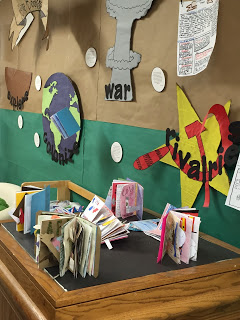 |
| Student exhibitions, The Museum School |
Marion High School students in South Carolina talked with us about the value of critical thinking and personalized learning. I was struck by how keenly aware they were of social and economic inequality, and by their sharp assessment of how resource allocation shaped their lives. In Atlanta, at the Museum School of Avondale Estates, we met teachers incorporating STEAM education using museums as a model for inquiry. Students develop their own exhibitions and serve as docents to grownup visitors.
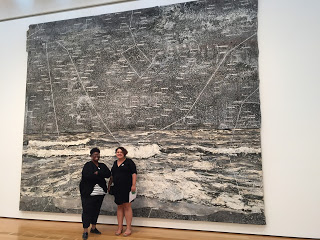 |
| Nicole (l) and Sage (r) at the High Museum of Art in ATL |
At the New Orleans roundtable, participants taught me just how limited “scalability” is as a frame for museum work. In the wake of Hurricane Katrina, the museums in that city had to re-think their responsibility to their communities. How could museums create spaces of play, wonder, and learning when they were physically uninhabitable? How do the various conditions under which (some) residents returned shape audience engagement? What is the museum’s responsibility to visitor engagement when its local visitorship is physically displaced? How will new visions of New Orleans museums help people think about ecology and resource management? All these questions, while having national import, have a distinctly place-based context and demand place-based, community-driven solutions.
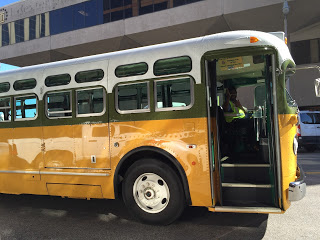 |
| Rosa Parks Bus-Boycott-themed transit tour with the Rosa Parks Museum in Montgomery, AL |
From this Road Trip as a “laboratory on wheels,” I came to know that museums can offer respite, that they can be places of quiet contemplation and individual study. But I was equally thrilled to witness how museums can also–and often at the same time–be sites for gathering, for community-building. Indeed, museums are more than the sums of their collections, staffs, programs, and exhibitions. They provide opportunities for “being together with others” and teach us to hear the resonances of the past in the visions we craft for our future.
More Than Tours
Equal Justice Initiative
Kimberly Coleman, Outreach Coordinator, Collections Manager

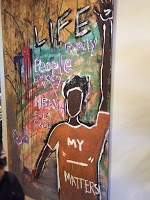



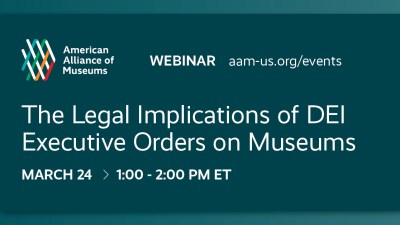
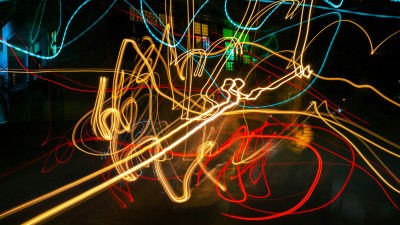

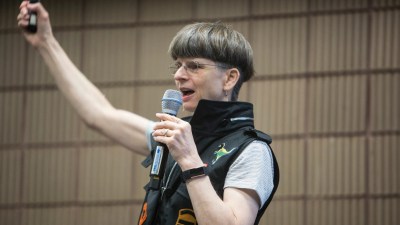
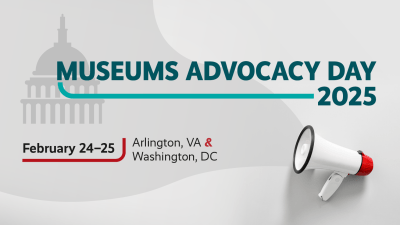
Comments